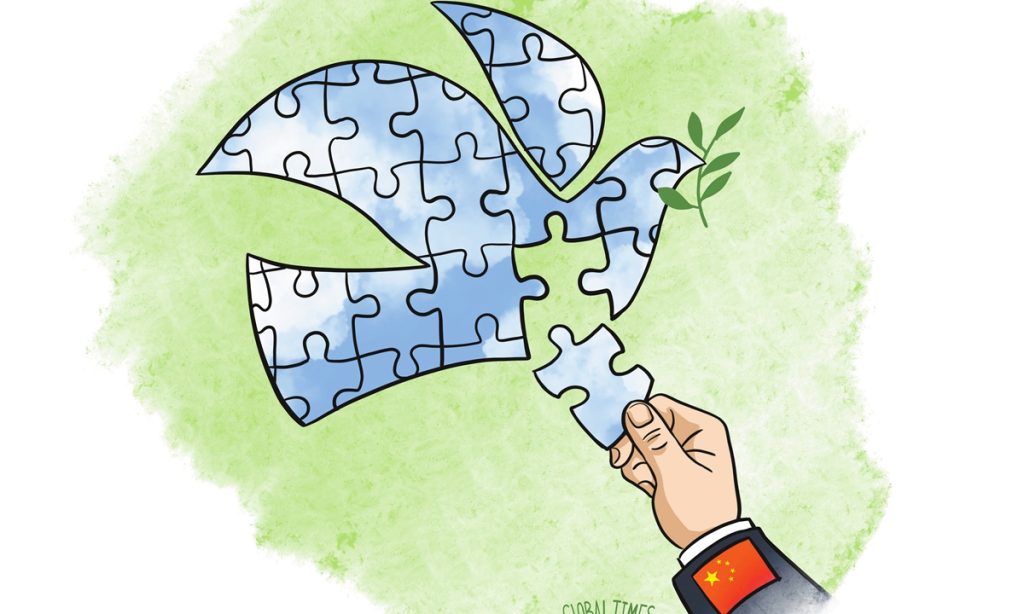Chinese mediation efforts in Middle East earn credibility, trust

By fostering reconciliation among different Palestinian factions, the recent Beijing Declaration symbolizes hope and offers an alternative approach to addressing the longstanding Middle East conflict.
Although some may argue that the Beijing Declaration simply reiterates past statements on intra-reconciliation between different Palestinian factions, it cannot be dismissed as lacking innovation. This document presents new avenues for achieving lasting peace in the Middle East and serves as a testament to China's innovative mediation efforts. Its potential impact extends far beyond diplomatic success, offering a glimmer of hope for a better future in a conflicted region.
The Beijing Declaration provides a more comprehensive framework to unite the voices of Palestine, laying a foundation for the future establishment of a Palestinian state. A major obstacle in achieving a two-state solution is the internal division and fragmentation within Palestine's political forces. However, unlike previous agreements, the Beijing Declaration not only aims to reconcile Fatah and Hamas but also includes all other significant factions in Palestine, creating a platform for unifying their political voice.
As President Xi Jinping called for a more inclusive international peace conference on the Palestine issue, the Beijing Declaration has opened a new channel and provided a crucial supporting framework. The involvement of Egypt and Algeria in this declaration ensures its continuation as a concerted effort. Just after its announcement, Sven Koopmans, European Union Special Representative for the Middle East Peace Process, acknowledged China's "important role in reconciliation based on a two-state solution." This declaration solidifies China's position as a key player in promoting peace and stability in the region.
The Beijing Declaration, announced at a crucial time, has the power to reignite hope and confidence within the international community for a two-state solution. This declaration comes as previous deals have failed to address the pressing issue of marginalization toward this solution, which is now facing its greatest crisis yet. The unbalanced power dynamic between Palestine and Israel hinders any real progress toward revitalizing the two-state solution. Restoring unity among the various rival factions within Palestine could help rebalance their leverage in negotiations with Israel and inject new life into the long-stalled peace process for Palestine.
Ever since the successful mediation between Saudi Arabia and Iran last year, China's involvement in the Middle East has steadily increased. As it navigated through complex conflicts, China gained invaluable experience in the art of mediation. In contrast to traditional methods, China has brought fresh and innovative elements to its mediation efforts, leaving a lasting impact on the region.
China places great importance on ensuring that mediation is rooted in just values that align with international standards of justice. This was evident in its involvement in the Palestine conflict, where a balance between realpolitik tactics and adherence to just values was crucial in reaching a compromise among the involved parties. China always maintains respect for territorial integrity and sovereignty, not just in the Middle East but also in other conflict-ridden regions.
For instance, in the case of Syria, China has exercised its veto power multiple times in the UN Security Council to prevent military intervention, because it recognized the importance of balancing power dynamics. This approach has earned China trust among regional countries, making it a powerful mediator in various conflicts.
From China's perspective, mediation is seen as a continuous and sustainable effort that is of utmost importance in earning credibility. The peace process in the Middle East is a challenging task, filled with unpredictable twists and turns. A mediator must understand that a single peace deal will not be a quick fix to deeply-rooted conflicts, and that maintaining a long-term and sustainable effort is key. In contrast to the US approach, China's engagement in Middle East peace is not influenced by partisan interests or government turnover. This serves as an institutional guarantee for China to effectively participate in the peace process and bring about lasting change.
China firmly believes that mediation should not be weaponized and used as a tool for geopolitical confrontations. In contrast to US initiatives in the region, China's mediation approach does not rely on the leverage of military alliances, but rather on its strong economic partnerships with Middle Eastern countries. Additionally, China's mediation efforts are not tied to any geopolitical intention. The focus remains on fostering peaceful relationships and promoting mutual cooperation among all nations involved.
China's involvement in mediating Middle East conflicts marks another significant achievement in its efforts to engage with the region. However, this path toward peace requires international cooperation as a necessary foundation. Despite key differences between China's mediation methods and those of the US, it embodies the ancient Chinese principle of finding harmony amid diversity. It is important to note that China's mediation does not contradict existing initiatives in the Middle East, but rather complements them, with a sincere hope for the Middle East to become an oasis of peace amid an increasingly fragmented world and a beacon of hope for global unity and understanding.